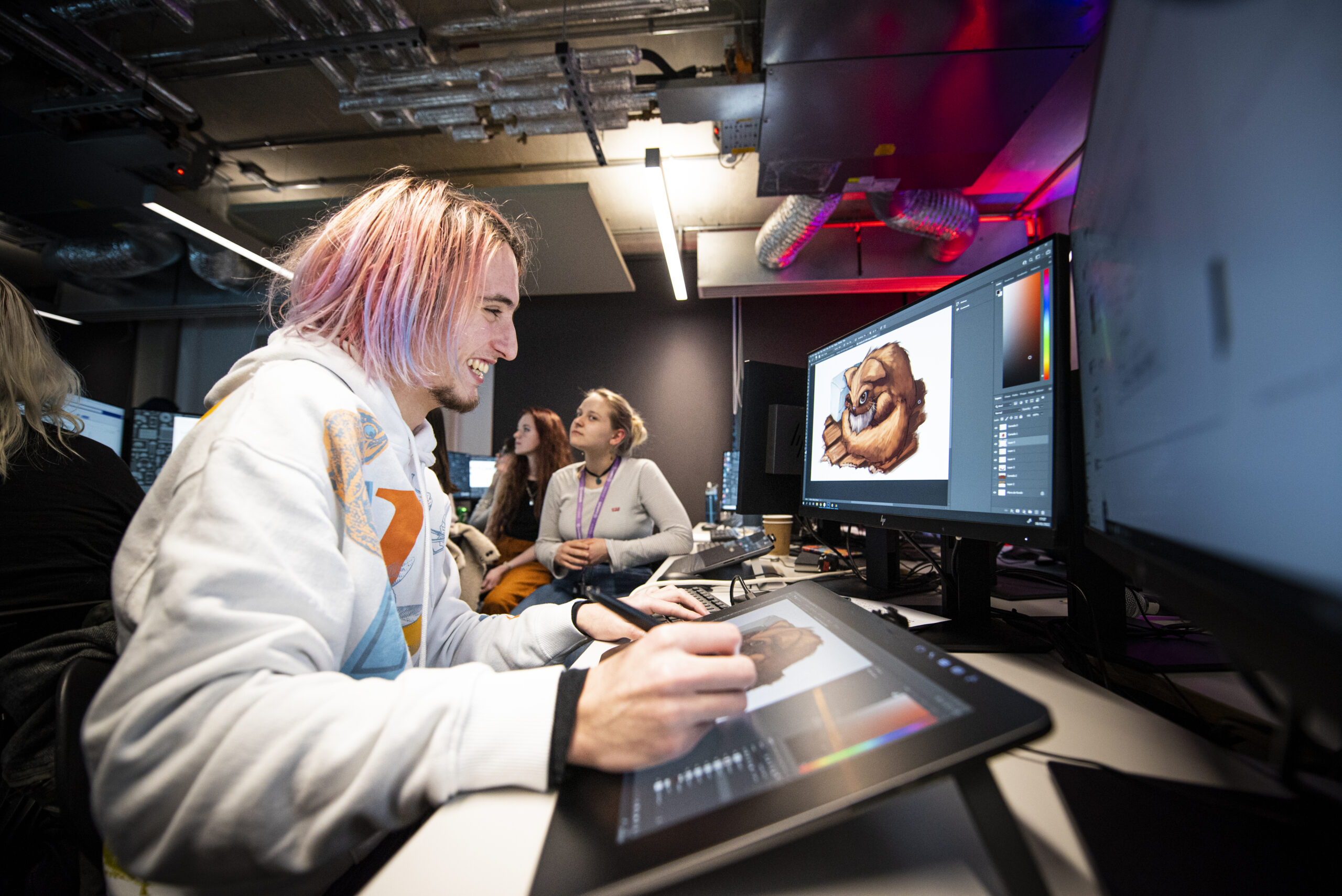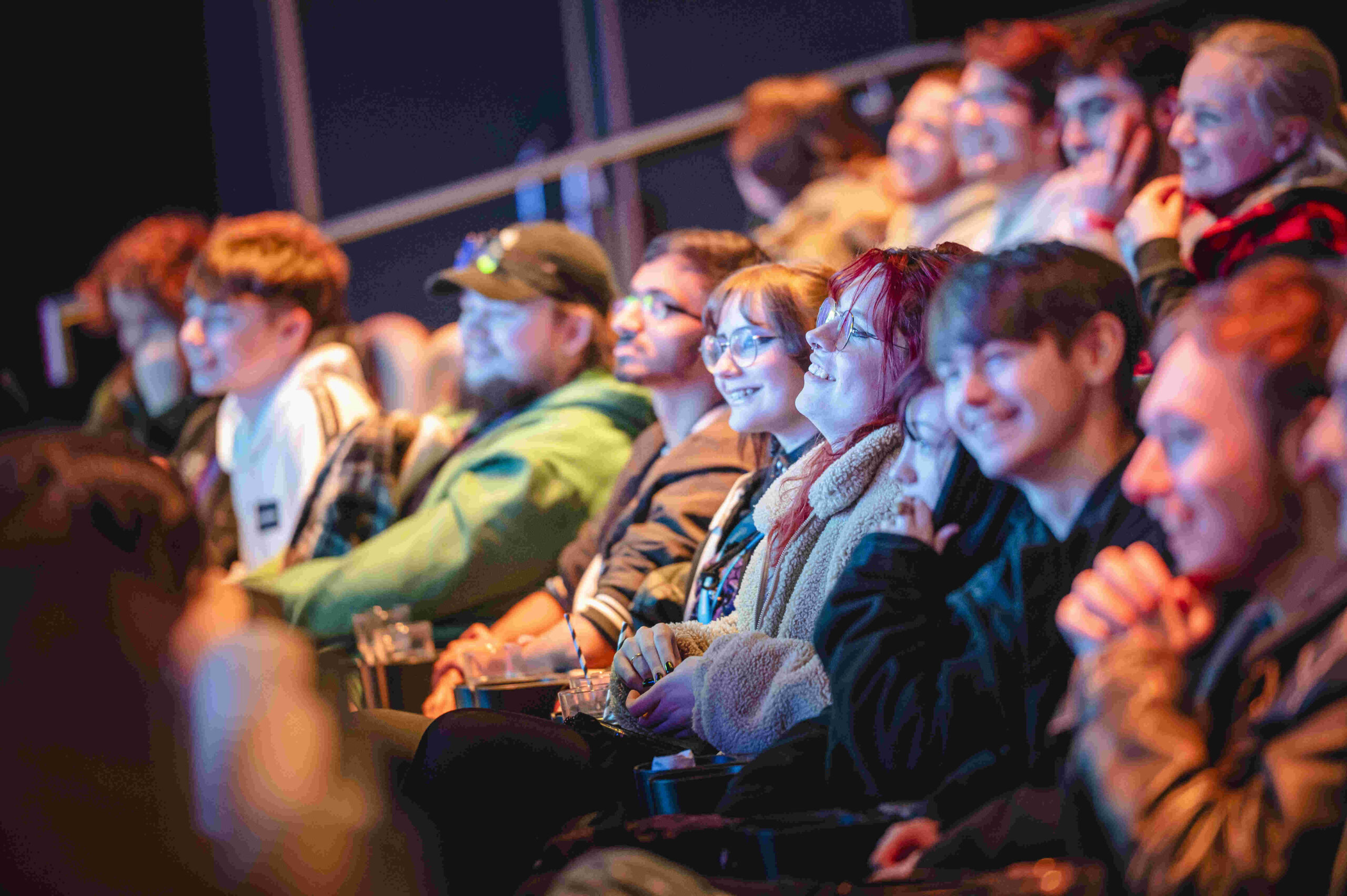Duration:
2 years full-time | Top-up available
Location:
Confetti Nottingham Campus, NTU
UCAS course code:
I620
Institution code:
N91
Quick! We have some places remaining for this September at 48 UCAS points. Check out the entry requirements below.
This Games Technology foundation degree has been designed to meet the demands of the industry, allowing students to experience the core roles and learn the skills required for a graduate career in Games Technology.
The Games industry is multidisciplinary, focused on the manufacturing of games, predominantly in a team environment with multiple job roles. Students will learn about games architecture, asset production, games design and the games industry, using specialist, industry-standard hardware and software.
You will also learn industry-standard workflow methods in game design, 3D asset and 3D environment creation, Unreal Engine 5 development.
This course is for you if:
- you enjoy the art, experience and engagement provided by video games.
- you are good at generating and developing ideas and concepts.
- you are excited by innovation in game design and gameplay.
Progression route
Top-up your degree to a full BSc (Hons) qualification in Games Design at NTU
Clearing 2024
- 48 UCAS points from up to three qualifications
Spaces are limited, so call NTU’s Clearing hotline on 0115 848 6000 to secure your place.
2025 entry
- 64 UCAS Tariff points; and
- GCSE – English and Maths Grade C / 4
To find out what qualifications have tariff points, please use our tariff calculator.
Other qualifications and experience
We may also consider credits achieved at other universities and your work/life experience through an assessment of prior learning. This may be for year one entry, or beyond the beginning of a course where applicable, for example, into year 2. Our Recognition of Prior Learning and Credit Transfer Policy outlines the process and options available for this route.
Meeting our entry requirements
Hundreds of qualifications in the UK have UCAS tariff points attached to specific grades, including A levels, BTECs, T Levels and many more. You can use your grades and points from up to four different qualifications to meet our criteria. Enter your predicted or achieved grades into our tariff calculator to find out how many points your qualifications are worth.
How to apply
This degree is validated by Nottingham Trent University. You can apply through UCAS.
Preparing for the financial side of student life is important, but there’s no need to feel anxious and confused about it. We hope that our fees and funding pages will answer all your questions.
Games Architecture (40 Credit Points)
Explore key principles of level design and programming theory underpinning games architecture via the use of industry-standard games engines. You will be introduced to the workflow methods, skills and techniques required to design and develop gameplay scenarios and in-game mechanics.
Asset Production for Games (40 Credit Points)
You’ll be introduced to the Autodesk Suite which focuses on the use of 3DS Max and Maya to create game assets. These include general asset design, weapon design and environment design. You’ll also get an introduction to the production and recording of game audio focusing on Foley and sound effects.
Games Design (20 Credit Points)
Learn the theory behind games design, how they’re structured and how they’re built. You’ll also create your own original games mechanics and concepts, including characters and various environments.
Games Industry (20 Credit Points)
Explore the global markets that make up the world’s Games industry. You’ll explore trends and developments, develop an understanding of the economic processes involved in the creation of games, and understand the steps involved in getting a game to market.
Level Production (40 Credit Points)
You’ll create an original video game level prototype. You’ll complete integration of your original 3D and audio assets within a relevant games engine, working towards the goal of developing your own original and fully functioning, game sequence.
Advanced Asset Production (40 Credit Points)
Following on from Asset Production in Year One, you’ll be introduced to advanced modelling and sculpting techniques to effectively produce original 3D character models and environments to an industry-standard.
Games Development and Realisation (20 Credit Points)
During this module, you’ll increase your experience of level-design. You’ll learn to effectively manage the production of a game, from concept to build, and be introduced to the process of project management.
Industry Practice (20 Credit Points)
Undertake appropriate self-directed projects, working collaboratively on creative work, allowing you to directly apply the knowledge and skills learnt throughout the programme in the context of the workplace. This module aims to develop your overall professionalism and provide you with the knowledge and resources to begin a career in the creative industries.
Do It For Real
Industry Week
Studying at Confetti you’ll take part in Industry Week where you’ll be able to meet a range of professionals within your field of interest as well as other areas of the creative industries.
Past guests include John Romero (ID Software), Minh Le (Counter-Strike), The Oliver Twins (Codemasters), Games Workshop, Ubisoft and Splash Damage.
Student work
Our Talent Development team works closely with course leaders to link students with opportunities across the industry. Games Technology students have previously worked with and visited leading companies, such as:
- Mantic Games
- Games Workshop
- Sumo Digital
On this course you’ll study in Confetti HQ – our brand new £9.1million digital media hub. You’ll have access to:
- Unreal Engine 5
- Autodesk Maya
- Autodesk 3DS Max
- Autodesk Mudbox
- Adobe Creative Suite
- Quixel 2.0
- Industry standard workstation computers
- Ergonomic gaming keyboards and mice
- Wacom Cintiq 13HD Graphics Tablets
- Games Consoles and controllers
- Audio production and recording facilities
Courses
After finishing your foundation degree, you may decide to go straight into industry or top-up to a full honours degree.
If you achieve a Commendation or higher grade, you’ll be able to progress onto the Level 6 (Final Year) of the popular BSc (Hons) Games Design at NTU course.
For those completing their foundation degree with a Pass, you’ll have the opportunity to progress onto Level 5 (Year Two) of the course.
If you choose to progress onto the full honours degree at NTU, you’ll be invited to a transition tutorial with the Games Design course team at NTU. The aim of the tutorial is for you to meet the course team; present your work; and for the team to ensure any appropriate support (if necessary) is made available to you before you progress.
What roles do our graduates go on to?
- 3D artist
- Programmer
- Technical artist
- Level designer
- Game designer
- Animator
- QA tester
- Producer
NTU Employability Support
Our support doesn’t end when you graduate. As a Confetti and NTU student you will be entitled to dedicated graduate employability support for up to three years after you complete your studies. You’ll have access to exclusive events, initiatives and work experience opportunities to support you in the early stages of your graduate career.






